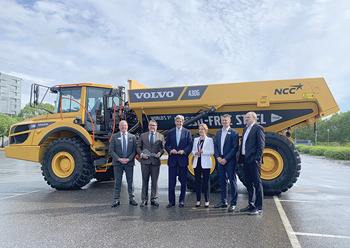
Present at the ceremony to commemorate the milestone were Martin Lundstedt, President and CEO of the Volvo Group, Tomas Carlsson, President and CEO of NCC, John Kerry, US Special Presidential Envoy for Climate, Annika Strandhäll, Swedish Minister for Climate, Jernberg and Lindqvist.
Volvo CE delivers hauler built with green steel
01 July 2022
In its latest move towards carbon neutrality, Sweden-based Volvo Construction Equipment (Volvo CE) says it has become the world’s first manufacturer to deliver a construction machine built using fossil-free steel to a customer.
The A30G articulated hauler, built using fossil-free steel, was handed over by Volvo CE President of Melker Jernberg to long-standing customer NCC last month at a ceremony hosted by LeadIt – the Leadership Group for Industry Transition – in conjunction with the United Nations environmental meeting Stockholm +50.
The move comes just nine months after the company unveiled the world’s first vehicle concept using fossil-free steel, as part of the testing of implementation in an ordinary production set-up.
“While commercial introduction is expected to be gradual with selected customers, this speedy first handover is an important milestone in the group’s ambition to drive industry transformation towards global climate goals. The A30G is produced at Volvo CE’s facility in Sweden, using the existing manufacturing process, with fossil-free steel from Swedish steel company SSAB,” says a spokesman for Volvo CE.
Jernberg says: “We are sure that to succeed in decarbonising the construction industry, players in the value chain will need to collaborate and act. Thanks to our strong partnerships with other forward-thinking companies, we are now able to lead the change towards fossil-free construction and be the first to deliver a machine built using fossil-free steel to a customer. Turning commitments into actions is key to building the world we want to live in.”
As part of its Science-Based Targets commitment, Volvo CE says it is set to achieve net-zero greenhouse gas emissions by 2040. Alongside the electrification of its machines, the company recognises the importance of reducing its carbon footprint across its entire value chain. This includes the raw materials used in its products, of which steel is a major component. The production using fossil-free steel in Volvo CE’s machines and components will be gradual and depend on aspects such as steel availability.
SSAB Oxelösund produced the world’s first fossil-free steel and delivered it to Volvo Group in July last year. This steel was produced using Hybrit (Hydrogen Breakthrough Ironmaking Technology) technology.
“The first fossil-free steel in the world is not only a breakthrough for SSAB, it represents proof that it’s possible to make the transition and significantly reduce the global carbon footprint of the steel industry. We hope that this will inspire others to also want to speed up the green transition,” says Martin Lindqvist, President and CEO of SSAB.
“Industry, and especially the steel industry, creates large emissions but is also an important part of the solution. The work done by SSAB, LKAB and Vattenfall within the framework of Hybrit drives the development of the entire industry and is an international model,” says Sweden’s Minister of Trade and Industry of Sweden Ibrahim Baylan.
In 2016, SSAB, LKAB, Europe’s largest iron ore producer, and Vattenfall, one of Europe’s largest energy companies, joined forces to create Hybrit. Using this technology, SSAB aims to replace coking coal, traditionally needed for ore-based steelmaking, with fossil-free electricity and hydrogen. The result will be the world’s first fossil-free steelmaking technology, with virtually no carbon footprint. In June 2021, the three companies were able to showcase the world’s first hydrogen-reduced sponge iron produced at Hybrit’s pilot plant in Luleå, which has since been used to produce the first steel made with this breakthrough technology.
The goal is to deliver fossil-free steel to the market and demonstrate the technology on an industrial scale as early as 2026.
- Hamm to launch new tandem rollers at bauma
- Volvo CE delivers hauler built with green steel
- Glass installations mimic nature
- Niagara provides solution in niche hotels
- Reynaers’ team meets for strategic planning


